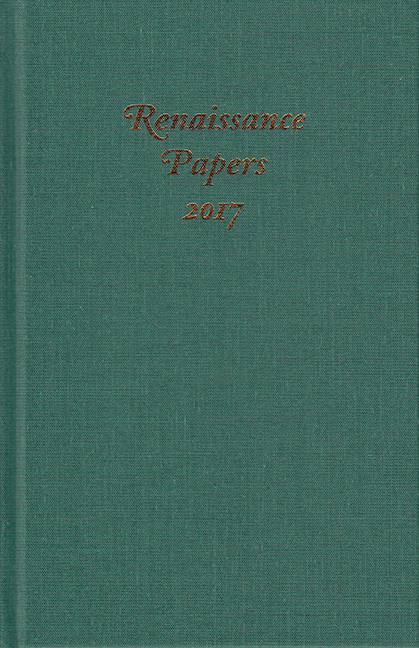Book contents
- Frontmatter
- Contents
- Dedication
- The Contested Pliability of Sacred Space in St. Paul's Cathedral and Paul's Churchyard in Early Modern London
- Classicism from Urbino: The Bichi Chapel Frescoes by Francesco di Giorgio Martini
- Visualizing the Paragone in Francisco de Zurbarán's Crucifixion with a Painter
- A Change in the Making: Shakespeare's Ovidian Sleep of Death and Display
- Old Black Rams and Mortal Engines: Transhumanist Discourse in Othello
- Dying with Speed and Felicity: Humor and Death in Book 3 of the Faerie Queene
- “If Devils Will Obey Thy Hest”: Devils in Dr. Faustus and The French Historie
- Rewriting Lucrece: Intertextuality and the Tale of Lucrece
- Economy and “Honesty” in Thomas Middleton's A Chaste Maid in Cheapside
- Glossing Authorship: Printed Marginalia in Aemilia Lanyer's Salve Deus Rex Judaeorum
- Botany and the Maternal Body in Titus Andronicus
- Unhorsing the Lustiest Challenger: Reflections on Chivalry in Richard II and Henry IV, Part 1
A Change in the Making: Shakespeare's Ovidian Sleep of Death and Display
Published online by Cambridge University Press: 04 April 2019
- Frontmatter
- Contents
- Dedication
- The Contested Pliability of Sacred Space in St. Paul's Cathedral and Paul's Churchyard in Early Modern London
- Classicism from Urbino: The Bichi Chapel Frescoes by Francesco di Giorgio Martini
- Visualizing the Paragone in Francisco de Zurbarán's Crucifixion with a Painter
- A Change in the Making: Shakespeare's Ovidian Sleep of Death and Display
- Old Black Rams and Mortal Engines: Transhumanist Discourse in Othello
- Dying with Speed and Felicity: Humor and Death in Book 3 of the Faerie Queene
- “If Devils Will Obey Thy Hest”: Devils in Dr. Faustus and The French Historie
- Rewriting Lucrece: Intertextuality and the Tale of Lucrece
- Economy and “Honesty” in Thomas Middleton's A Chaste Maid in Cheapside
- Glossing Authorship: Printed Marginalia in Aemilia Lanyer's Salve Deus Rex Judaeorum
- Botany and the Maternal Body in Titus Andronicus
- Unhorsing the Lustiest Challenger: Reflections on Chivalry in Richard II and Henry IV, Part 1
Summary
For at the first their shape was such, as in a certain sort Resembled man, but of the right and perfect shape came short. Even like to Marble ymages new drawne and roughly wrought, Before the Carver by his Arte to purpose hath them brought.
—Ovid, Metamorphoses, I:481–84Why then, O brawling love, O loving hate, O anything of nothing first create; O heavy lightness, serious vanity, Misshapen chaos of well-seeming forms, Feather of lead, bright smoke, cold fire, sick health, Still-waking sleep, this is not what it is!
—Shakespeare, Romeo and Juliet, 1.1.169–74IN the Metamorphoses, change descends swiftly, a making, or rather remaking, unbound by material limits and untroubled by the suffering of those it transforms. Whether in service of divine desire or as a means of eluding it, such metamorphosis is as immediate as it is inexorable. By contrast, human making is slow, and in Ovid's poem, it is most often engendered through the mediating power of the gods. This distinction is present in book 1 where the creation of the world is envisioned as Jove disentangling chaos, an admixture of contradictory forces parted and “set in order straight” through an act of divine perception and will. When an ancient flood later destroys humanity in the wake of Jove's anger, remaking the race falls to the Noah-like survivor, Deucalion and his wife Pyrrha. As instructed by Themis, they toss stones over their shoulders, which then begin “to warre both soft and smoothe and shortly afterwarde / To winne therwith a better shape.”
The resulting metamorphosis is in marked contrast to the immediacy of that enacted by the gods: “For at the first their shape was such, as in a certain sort / Resembled man, but of the right and perfect shape came short. / Even like to Marble ymages new drawne and roughly wrought, / Before the Carver by his Arte to purpose hath them brought.” Though initially insufficient in form, Deucalion and Pyrrha's softened stones serve to repopulate the earth. Emphasizing the role of divine will in this process, the narrator concludes: “Thus by the mightie power of God ere lenger time was past, / The mankind was restorde by stones the which a man did cast.”
- Type
- Chapter
- Information
- Renaissance Papers 2017 , pp. 49 - 64Publisher: Boydell & BrewerPrint publication year: 2018

